-
 Bitcoin
Bitcoin $96,674.0520
-2.01% -
 Ethereum
Ethereum $2,757.6706
-0.12% -
 Tether USDt
Tether USDt $1.0002
-0.01% -
 XRP
XRP $2.3843
-6.05% -
 Solana
Solana $196.5766
-5.36% -
 BNB
BNB $569.7376
-0.51% -
 USDC
USDC $1.0001
0.01% -
 Dogecoin
Dogecoin $0.2557
-3.44% -
 Cardano
Cardano $0.7344
-1.65% -
 TRON
TRON $0.2218
-1.23% -
 Chainlink
Chainlink $19.1160
-4.62% -
 Avalanche
Avalanche $25.7876
-3.28% -
 Sui
Sui $3.2964
-9.82% -
 Stellar
Stellar $0.3269
-4.54% -
 Toncoin
Toncoin $3.7683
-0.68% -
 Shiba Inu
Shiba Inu $0.0...01567
-0.70% -
 UNUS SED LEO
UNUS SED LEO $9.8656
1.07% -
 Hedera
Hedera $0.2377
-5.76% -
 Hyperliquid
Hyperliquid $24.7854
-3.13% -
 Bitget Token
Bitget Token $6.5550
0.85% -
 Litecoin
Litecoin $103.9983
2.10% -
 Polkadot
Polkadot $4.6800
-1.29% -
 Bitcoin Cash
Bitcoin Cash $325.9859
-1.62% -
 Ethena USDe
Ethena USDe $0.9999
0.06% -
 MANTRA
MANTRA $5.7661
-1.70% -
 Uniswap
Uniswap $9.2241
1.36% -
 Dai
Dai $1.0000
0.02% -
 Monero
Monero $228.6821
3.85% -
 Pepe
Pepe $0.0...09983
-1.77% -
 Ondo
Ondo $1.3201
-3.74%
What are the regulatory risks associated with Maple Token (MPL)?
Maple Token's regulatory landscape remains uncertain due to its decentralized lending structure, and its classification as a security or utility token could determine its compliance obligations.
Dec 25, 2024 at 05:56 pm

Key Points:
- Maple Token (MPL) faces regulatory uncertainties due to its decentralized lending structure.
- Its classification as a security or utility token remains unclear, which could determine the applicable regulations.
- Compliance with anti-money laundering (AML) and know-your-customer (KYC) requirements pose challenges.
- Cross-border operations and market manipulations also raise regulatory concerns.
Regulatory Risks Associated with Maple Token (MPL)
1. Unclear Token Classification:
The regulatory classification of MPL is crucial as it determines the applicable rules and regulations. If MPL is deemed a security, it may be subject to stringent regulations, including registration with the Securities and Exchange Commission (SEC) or similar agencies. Conversely, if MPL is classified as a utility token, it may enjoy less regulatory oversight.
2. AML and KYC Compliance:
As a decentralized lending platform, Maple faces challenges in ensuring compliance with AML and KYC requirements. The platform does not hold customer funds but relies on a network of lenders and borrowers who interact directly, increasing the risk of money laundering and illegal activities. To mitigate this risk, Maple has implemented certain measures, such as identity verification and transaction monitoring.
3. Cross-border Operations:
Maple operates across multiple jurisdictions, which poses regulatory challenges. Different countries have varying laws and regulations governing cryptocurrency and decentralized finance (DeFi). Maple must navigate these complexities to ensure compliance in all regions it serves. This requires thorough due diligence, staying abreast of regulatory changes, and adapting the platform accordingly.
4. Market Manipulations:
The decentralized nature of Maple introduces the risk of market manipulations. Lenders and borrowers could potentially collude to artificially inflate or deflate the price of MPL. This could impact the stability of the platform and harm investors. Maple employs various countermeasures to prevent such manipulations, such as transaction monitoring and a robust community governance model.
5. Regulatory Uncertainty and Evolution:
The cryptocurrency regulatory landscape is constantly evolving. As regulators gain a better understanding of DeFi, they may introduce new rules that could impact Maple Token (MPL). Staying abreast of these changes and adapting the platform accordingly will be crucial for Maple to maintain compliance and avoid legal challenges.
FAQs:
Q: Is Maple Token (MPL) regulated?
A: Maple Token (MPL) is not currently subject to specific regulations due to its decentralized nature and unclear token classification. However, it faces regulatory uncertainties and must comply with applicable laws and regulations.
Q: How does Maple address the regulatory risks associated with MPL?
A: Maple has implemented measures to address regulatory risks, such as:
- Engaging with regulators and policymakers to clarify the token's classification and regulatory requirements.
- Implementing AML and KYC procedures to prevent money laundering and illegal activities.
- Monitoring cross-border operations to ensure compliance with different jurisdictions.
- Employing countermeasures to prevent market manipulations.
- Staying abreast of regulatory developments and adapting the platform accordingly.
Disclaimer:info@kdj.com
The information provided is not trading advice. kdj.com does not assume any responsibility for any investments made based on the information provided in this article. Cryptocurrencies are highly volatile and it is highly recommended that you invest with caution after thorough research!
If you believe that the content used on this website infringes your copyright, please contact us immediately (info@kdj.com) and we will delete it promptly.
- ETHEREUM's Wall Street Guy: The Protocol
- 2025-02-06 09:11:01
- XRP (XRP) Suffers One of Its Worst Days This Year as XRL Ledger Malfunction Adds Selling Pressure
- 2025-02-06 09:11:01
- XRP Analysis: A Liquidity-Driven Market
- 2025-02-06 09:11:01
- Is Bitcoin (BTC) Price Bottom Finally In Following the Biggest Crash in Crypto History?
- 2025-02-06 09:11:01
- Tether (USDT) Stablecoin Issuer Announces Expansion Strategy that Enters the Artificial Intelligence Sector
- 2025-02-06 09:11:01
- Bitcoin Consolidates As Retail Remains Off The Market
- 2025-02-06 09:11:01
Related knowledge
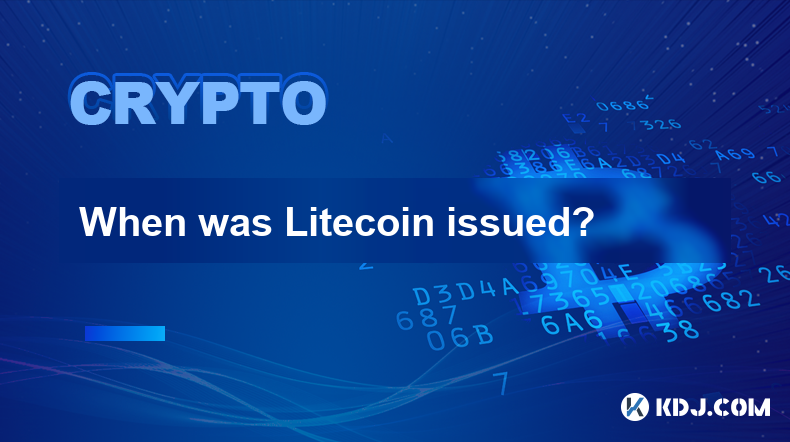
When was Litecoin issued?
Feb 04,2025 at 02:36am
When was Litecoin Issued?Key Points:Litecoin's inception and developmentLitecoin's launch date and market dynamicsLitecoin's technical specifications and key featuresLitecoin's Inception and DevelopmentLitecoin, conceived by former Google engineer Charlie Lee, emerged as a fork of Bitcoin in October 2011. Inspired by Bitcoin's revolutionary blockchain t...
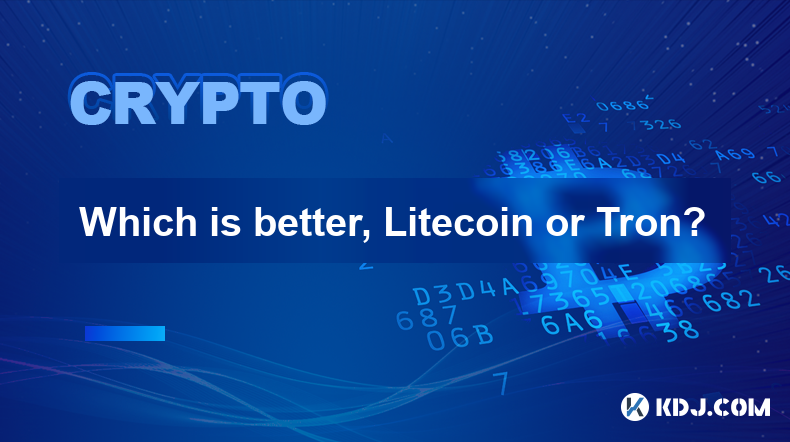
Which is better, Litecoin or Tron?
Feb 04,2025 at 10:30pm
Key Points:Similarities between Litecoin and Tron: Decentralized, open-source blockchain platformsDifferences between Litecoin and Tron: Use cases, consensus mechanisms, transaction speedsFactors to consider when choosing between Litecoin and Tron: Investment goals, risk tolerance, specific use casesPotential benefits and drawbacks of Litecoin and Tron:...
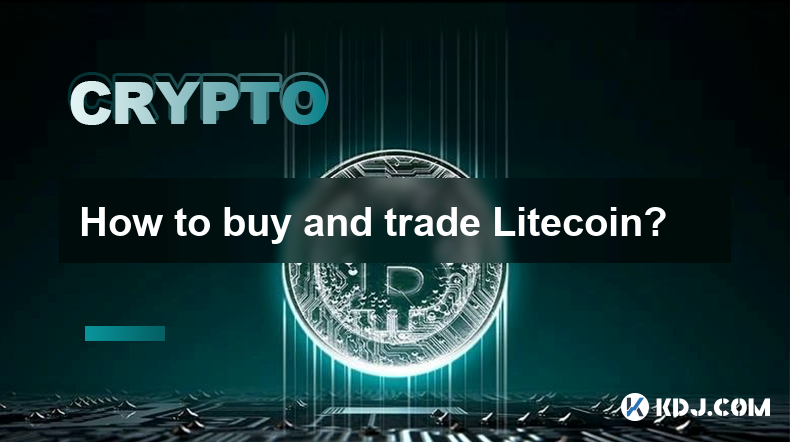
How to buy and trade Litecoin?
Feb 04,2025 at 12:24pm
Key Points:Understand the Basics of LitecoinSelect a Suitable Cryptocurrency ExchangeCreate an Account on the ExchangeFund Your AccountPlace a Buy Order for LitecoinSecurely Store Your LitecoinUnderstand Litecoin TradingHow to Buy Litecoin?1. Understand the Basics of LitecoinLitecoin (LTC) is a decentralized digital currency similar to Bitcoin.Created i...
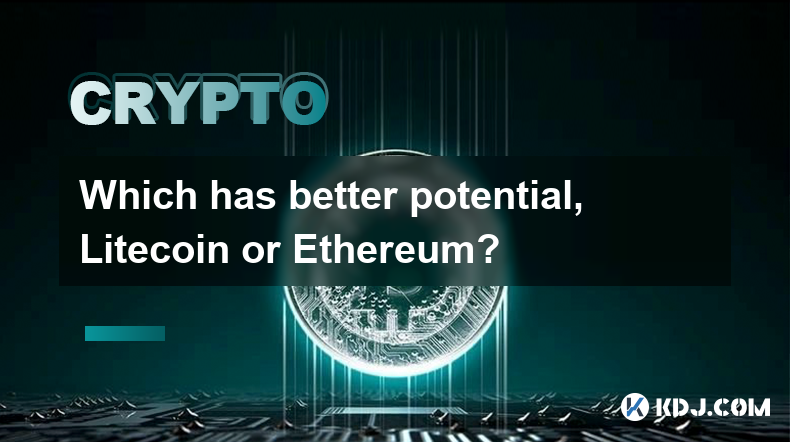
Which has better potential, Litecoin or Ethereum?
Feb 04,2025 at 05:30pm
Key Points:Litecoin and Ethereum are two of the most popular cryptocurrencies in the world.Both coins have their own unique advantages and disadvantages.Litecoin is a faster and cheaper transaction coin than Ethereum.Ethereum is a more versatile platform than Litecoin, and it can be used to create decentralized applications (dApps).Litecoin has a long h...
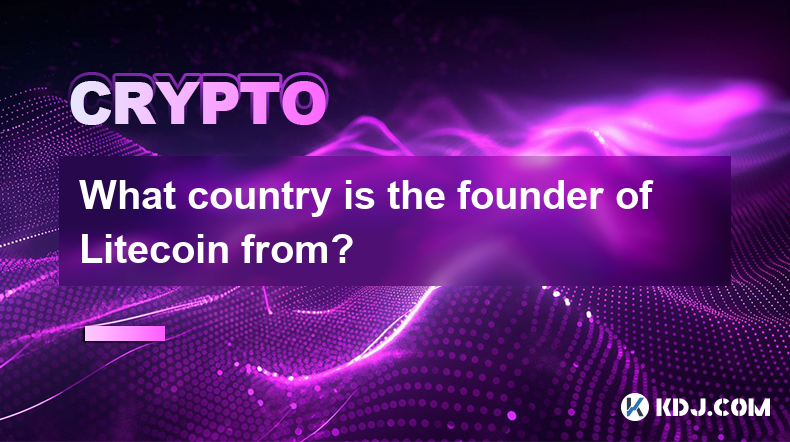
What country is the founder of Litecoin from?
Feb 04,2025 at 05:55am
Key Points:Litecoin's Founder and the Relationship with Charles LeeLitecoin's Technical Features and Similarities to BitcoinLitecoin's Role in the Cryptocurrency Ecosystem and Its PopularityComparative Analysis of Litecoin with Major CryptocurrenciesLitecoin's Community Involvement and PartnershipsArticle Content:Litecoin's Founder and the Relationship ...
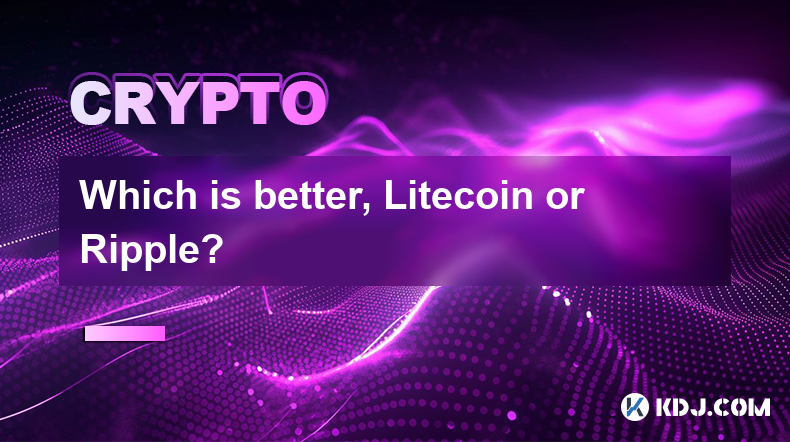
Which is better, Litecoin or Ripple?
Feb 04,2025 at 08:00pm
Key Points:Litecoin: a decentralized, peer-to-peer cryptocurrency based on the Proof-of-Work consensus mechanismRipple: a centralized, enterprise blockchain solution designed for fast and low-cost paymentsDirect comparison of Litecoin vs. Ripple in terms of technology, market capitalization, use cases, and transaction feesPotential benefits and drawback...

When was Litecoin issued?
Feb 04,2025 at 02:36am
When was Litecoin Issued?Key Points:Litecoin's inception and developmentLitecoin's launch date and market dynamicsLitecoin's technical specifications and key featuresLitecoin's Inception and DevelopmentLitecoin, conceived by former Google engineer Charlie Lee, emerged as a fork of Bitcoin in October 2011. Inspired by Bitcoin's revolutionary blockchain t...

Which is better, Litecoin or Tron?
Feb 04,2025 at 10:30pm
Key Points:Similarities between Litecoin and Tron: Decentralized, open-source blockchain platformsDifferences between Litecoin and Tron: Use cases, consensus mechanisms, transaction speedsFactors to consider when choosing between Litecoin and Tron: Investment goals, risk tolerance, specific use casesPotential benefits and drawbacks of Litecoin and Tron:...

How to buy and trade Litecoin?
Feb 04,2025 at 12:24pm
Key Points:Understand the Basics of LitecoinSelect a Suitable Cryptocurrency ExchangeCreate an Account on the ExchangeFund Your AccountPlace a Buy Order for LitecoinSecurely Store Your LitecoinUnderstand Litecoin TradingHow to Buy Litecoin?1. Understand the Basics of LitecoinLitecoin (LTC) is a decentralized digital currency similar to Bitcoin.Created i...

Which has better potential, Litecoin or Ethereum?
Feb 04,2025 at 05:30pm
Key Points:Litecoin and Ethereum are two of the most popular cryptocurrencies in the world.Both coins have their own unique advantages and disadvantages.Litecoin is a faster and cheaper transaction coin than Ethereum.Ethereum is a more versatile platform than Litecoin, and it can be used to create decentralized applications (dApps).Litecoin has a long h...

What country is the founder of Litecoin from?
Feb 04,2025 at 05:55am
Key Points:Litecoin's Founder and the Relationship with Charles LeeLitecoin's Technical Features and Similarities to BitcoinLitecoin's Role in the Cryptocurrency Ecosystem and Its PopularityComparative Analysis of Litecoin with Major CryptocurrenciesLitecoin's Community Involvement and PartnershipsArticle Content:Litecoin's Founder and the Relationship ...

Which is better, Litecoin or Ripple?
Feb 04,2025 at 08:00pm
Key Points:Litecoin: a decentralized, peer-to-peer cryptocurrency based on the Proof-of-Work consensus mechanismRipple: a centralized, enterprise blockchain solution designed for fast and low-cost paymentsDirect comparison of Litecoin vs. Ripple in terms of technology, market capitalization, use cases, and transaction feesPotential benefits and drawback...
See all articles

























































































